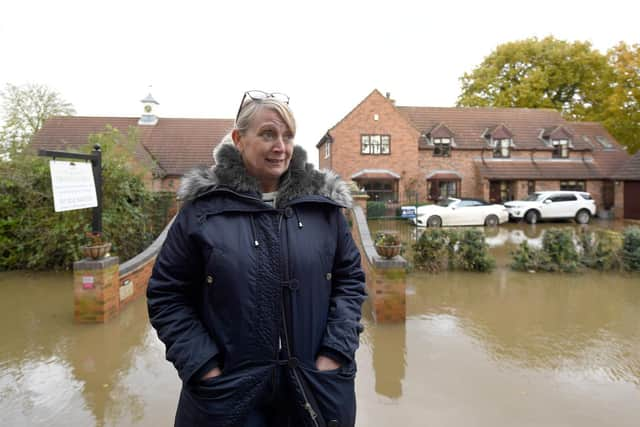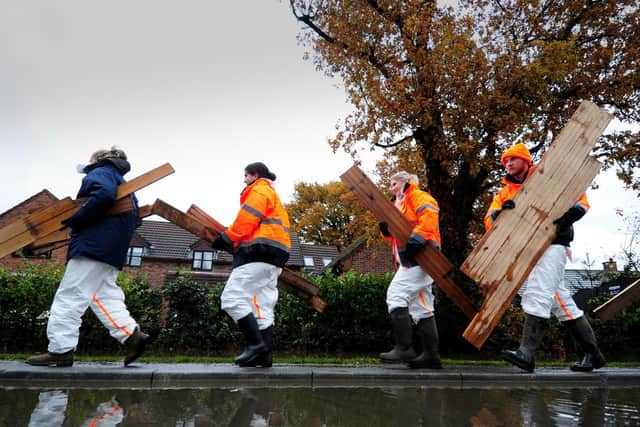Insurance review must prompt change in wake of South Yorkshire floods devastation, report author warns


Some people whose homes were flooded in Doncaster last year were sold insurance which had exemptions for flood risk, it emerged last week, amid revelations that tens of thousands of people nationwide could be missing out on subsidised schemes.
Now, speaking to The Yorkshire Post, report lead Amanda Blanc has spoken of how industry agreements – and potentially legislating landlords’ disclosures – could in future ease the burden of devastation and loss seen by so many in South Yorkshire.
Advertisement
Hide AdAdvertisement
Hide Ad“Unless you’ve been with somebody, unless you’ve sat in their home and listened to their experience, of how frightening it is to see those waters rising, you have no idea,” said Ms Blanc, group chief executive of insurance firm Aviva and former chairman of the Association of British Insurers (ABI). “They can lose all the things that are precious to them.


“Insurance is meant to be there to help in that situation. It should not be that people do not have that cover.”
Independent report
The full report drew on the views of more than 500 residents in Doncaster and villages straddling the River Don. While the vast majority of homeowners had some protection (97 per cent) around six per cent of people did not have flood cover in their policy.
There were specific exemptions, which Ms Blanc believes may have been added after flooding in 2007 and obscured in complex language, which left them particularly vulnerable. For some, she said, they hadn’t known, discovering only as the flood waters rose around them.


Advertisement
Hide AdAdvertisement
Hide AdThere had been concern costs may have been an issue but while a subsidised scheme was set up in 2006, in Flood Re, there was a suggestion up to half of brokers struggled to access it – meaning tens of thousands of people nationally could be missing out on support.
Awareness of the need for insurance is critical, said Ms Blanc, and dispelling distrust in myths that “insurance doesn’t pay”.
“Every year, whether we like it or not, and despite the money on defences or river dredging, we still know that there will be flooding,” said Ms Blanc. “Particularly in Yorkshire – we have seen it in Doncaster, in York and Hull and Leeds. I don’t think we can deny the impact of climate change.
“Nobody should be sold a home policy with a flood exclusion in it, unless they are explicitly aware and make that choice. That is absolutely made categorically clear. Someone living next to the River Don should not have been sold a flood exclusion.”
'Route map for change'
Advertisement
Hide AdAdvertisement
Hide AdThe review, setting out calls for codes of practice, Defra assessments and even legislation, will be considered by Government.
Ms Blanc, describing the report as a “route map” to change, said she felt a faint sense of anxiety that in five years’ time she might pick up the report and little has been agreed. Paying tribute to those who contributed, she said she had been touched by the selfless efforts of so many, such as a vicar’s wife in Bentley.
There was a determination for change from so many, she added, praising The Yorkshire Post’s persistence in seeking answers.
“We have to hold these agencies to account to make sure that they do get on with it and that it doesn’t become a PR exercise.”
Advertisement
Hide AdAdvertisement
Hide AdMore than 700 houses were deemed unlivable in Doncaster following last November’s floods. The review, using the area as a ‘deep dive’ to discern insurance barriers, found that while it was impossible to point any single finger of blame, a tightening of the system was need to prevent a “worrying” number of people falling through the cracks.
Among recommendations are a joint code of practice for insurers’ bodies, for landlords to disclose policies and suggestions this could be legislated, and for Defra to assess the scale of flood exemption rates by 2022.
_____________________________________________________________________
Support The Yorkshire Post and become a subscriber today. Your subscription will help us to continue to bring quality news to the people of Yorkshire. In return, you'll see fewer ads on site, get free access to our app and receive exclusive members-only offers. Click here to subscribe.